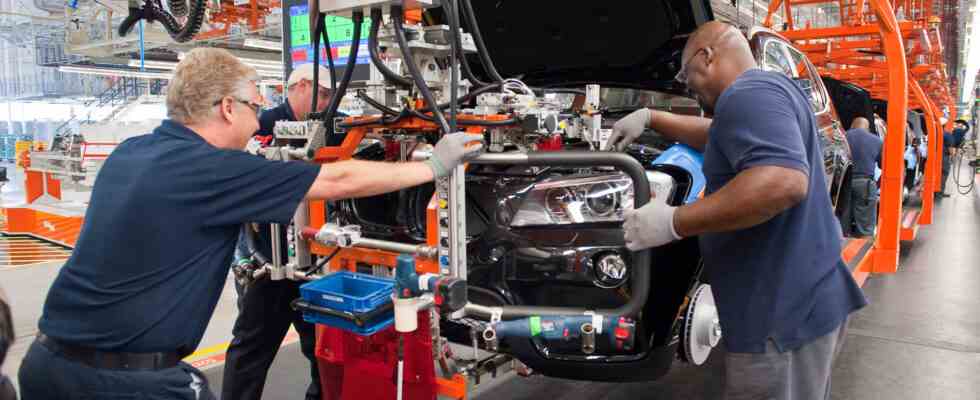Status: 03/03/2023 12:41 p.m
The “Inflation Reduction Act”, which provides billions in aid for climate technologies, is enticing more and more German companies to invest in the USA. Is Europe getting involved in a subsidy race out of concerns about job losses?
Audi, BMW, Schaeffler, Siemens Energy, Aurubis: The list of German companies planning major investments in the USA or expanding existing locations is getting longer and longer. Whether it’s the construction of electric cars, hydrogen production or metal recycling – generous subsidies attract companies with climate-friendly technologies to the USA in particular. With the “Inflation Reduction Act”, the government of US President Joe Biden is promoting climate-friendly investments in the United States with an enormous total of 430 billion dollars.
According to a survey by the German Chamber of Industry and Commerce, one in ten companies is already planning to relocate production. The car manufacturer BMW is already expanding and modernizing its plant in Spartanburg, South Carolina. The Munich group is investing 1.7 billion euros here. Competitor Audi is currently considering building a first US plant. The location is currently “highly attractive,” said Audi boss Markus Duesmann of the “Frankfurter Allgemeine Sunday newspaper”..
“The next works rather in America”
The energy technology manufacturer Siemens Energy is also toying with the idea of locating plants for the hydrogen economy in the United States. The automotive supplier Schaeffler recently sent out similar signals. “We’re more likely to build the next plants in America,” said CEO Klaus Rosenfeld of “Welt am Sonntag”.
Europe’s largest copper group, Aurubis, is currently building a new recycling plant in the state of Georgia, which is scheduled to go into operation next year and is now being expanded – also in response to US President Biden’s package of subsidies.
EU summit discusses Europe’s response
In Europe, the Inflation Reduction Act has alarmed many politicians. The high energy prices alone are a disadvantage for the location, said EU Commission President Ursula von der Leyen Deutschlandfunk: “If the investment funds from the United States come on top of that, it will be difficult for our companies here on the European side.“
The European Union wants to counter this with subsidies and its own investment programs in order to be able to compete with “green” technologies. Detailed decisions are to be made at the next EU summit in March.
A matter of speed
But all of this takes longer in Germany than in the United States, says Wolfgang Weber, general manager of the Electrical and Digital Industry Association (ZVEI). The biggest difference between the approach in the US and in Europe is perhaps not so much the amount of money, “but actually the speed of implementation, the implementation conviction with which this happens.”
Speed also convinced the chemical company Evonik. After the US government wants to subsidize two-thirds of a new production facility, the investment decision was made quickly, according to the company. Evonik is building a new plant for the production of so-called pharmaceutical lipids in the United States. According to the company, Washington is supporting the project, which is worth around 220 million dollars, with around 150 million dollars.
“Shall we play along?”
Biden’s billion-euro package has led to a subsidy race in which companies are also playing poker. For example, the US chip manufacturer Intel is now demanding further funding for the planned construction of a factory in Magdeburg. Instead of the promised 6.8 billion euros, there is now talk of ten billion euros that are needed.
“Of course, companies try to get the highest possible subsidies when they build new factories,” comments Clemens Fuest, President of the Munich ifo Institute. The economist takes a critical view of the development. “The question is: do we actually want to play there?” said Fuest. “Does it make sense to invest seven billion in subsidies in a project like in Magdeburg, in a single chip factory? I’m rather skeptical about that.” It would be better to use the money to fund research and development.
Concerns about a subsidy race and possible competitive disadvantages for production in Europe are also likely to be raised during Chancellor Olaf Scholz’s visit to Washington. And EU Commission President von der Leyen also wants to talk to US President Biden about European fears at a meeting planned for March 10. US Treasury Secretary Janet Yellen and Vice Commission President Valdis Dombrovskis discussed the matter earlier this week.
With information from Constantin Röse, ARD stock exchange studio.
US subsidies are having an effect – German companies on their way to the USA
Constantin Röse, HR, 03/03/2023 11:57 a.m

